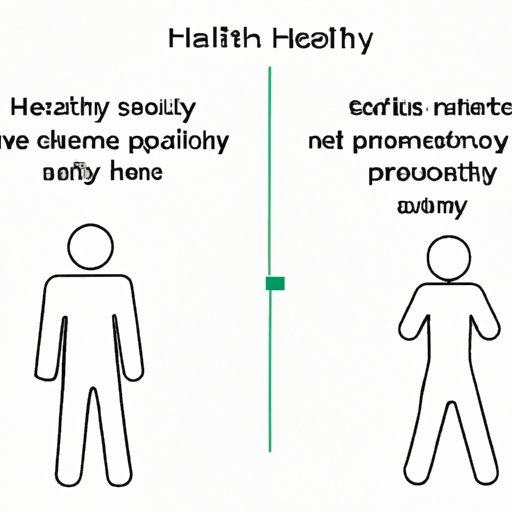Introduction
Insecurity is an emotion that many of us experience at some point in our lives. It can take the form of feeling inadequate, anxious, or uncertain. While it’s normal to feel insecure on occasion, when these feelings become persistent and interfere with your daily life, it’s important to address them. This article will explore what insecurity is, its causes, symptoms, and coping strategies.
Analyzing Insecurity: Causes, Symptoms and Coping Strategies
Insecurity is caused by a variety of factors, such as past experiences, relationships, and even genetics. It’s important to understand the underlying causes of your insecurity in order to effectively manage it.
Causes of Insecurity
One of the most common causes of insecurity is past experiences. These could include traumatic events, negative interactions with family or friends, or even criticisms from other people. Past experiences can lead to feelings of low self-worth and can cause you to doubt yourself. Unstable relationships can also be a source of insecurity. Feeling unsupported or unloved can lead to feelings of insecurity and loneliness.
Genetics can also play a role in insecurity. Studies have shown that some people are more prone to insecurity due to their genetic makeup. It’s important to remember that while genetics may make you more prone to insecurity, it doesn’t mean that you are doomed to feel this way forever. With the right tools and support, anyone can learn to manage their insecurities.
Symptoms of Insecurity
Insecurity can manifest itself in a variety of ways. Common symptoms include low self-esteem, fear of failure, lack of confidence, difficulty making decisions, and feelings of inadequacy. If left unchecked, insecurity can lead to anxiety and depression. It’s important to recognize the signs of insecurity so that you can take steps to address it.
Coping Strategies
The first step in dealing with insecurity is to identify the underlying cause. Once you have identified the source of your insecurity, you can begin to take steps to address it. Some coping strategies include talking to a therapist, practicing self-compassion, engaging in positive self-talk, and setting realistic goals. Additionally, it can be helpful to practice relaxation techniques such as deep breathing or meditation.
Exploring the Impact of Insecurity on Mental Health
Insecurity can have a profound impact on mental health. Studies have shown that there is a strong correlation between insecurity and depression. People who struggle with insecurity often find themselves trapped in a cycle of negative thinking, which can lead to feelings of hopelessness and despair. In addition, insecurity can also lead to anxiety. Anxiety can manifest itself in physical symptoms such as sweating, trembling, and a racing heart.
Unpacking the Role of Social Media in Cultivating Insecurity
Social media has become an integral part of many people’s lives. Unfortunately, it can also be a source of insecurity. Seeing other people’s “perfect” lives can make you feel like you’re not measuring up. Comparing yourself to others can lead to feelings of inadequacy and low self-esteem. The key to combating social media-induced insecurity is to focus on your own life and accomplishments instead of comparing yourself to others.
How Social Media Can Lead to Insecurity
Social media can be a breeding ground for insecurity. Seeing pictures of other people’s seemingly perfect lives can make you feel like you’re not good enough. Additionally, many people use social media as a platform to criticize and judge others, which can lead to feelings of insecurity. It’s important to remember that what people post on social media isn’t always an accurate representation of reality.
Ways to Combat Social Media-Induced Insecurity
The best way to combat social media-induced insecurity is to focus on yourself. Instead of comparing yourself to others, focus on your own accomplishments and strengths. Additionally, limit the time you spend on social media and take breaks from it when needed. Lastly, follow accounts that promote positivity and make you feel good about yourself.

Examining How to Overcome Insecurity in Relationships
Insecurity in relationships can be damaging. It can lead to mistrust, communication issues, and even physical or emotional abuse. In order to overcome insecurity in relationships, it’s important to recognize unhealthy patterns and take steps to improve communication.
Recognizing Unhealthy Patterns in Relationships
Insecure relationships often involve one partner trying to control the other. This can manifest as jealousy, possessiveness, or even physical or emotional abuse. It’s important to recognize these patterns in order to break the cycle of insecurity.
Steps for Improving Communication
Communication is key to overcoming insecurity in relationships. It’s important to talk openly and honestly with your partner and to listen to each other without judgement. Additionally, it can be helpful to set boundaries and to respect each other’s needs and wants. Finally, it’s important to be honest with yourself and your partner about your feelings and to recognize when something isn’t working.

Understanding the Difference Between Healthy and Unhealthy Insecurity
It’s important to understand the difference between healthy and unhealthy insecurity. Healthy insecurity is a natural emotion that can help you grow and develop. It can motivate you to work harder and to strive for success. Unhealthy insecurity, on the other hand, can be debilitating. It can lead to feelings of worthlessness and can prevent you from living your life to the fullest.
What is Considered Healthy Insecurity?
Healthy insecurity is a natural emotion that helps you strive for success. It can motivate you to work hard and to take risks. It can also help you recognize your weaknesses and take steps to improve them. Healthy insecurity can be a positive force in your life if you use it to your advantage.
What is Considered Unhealthy Insecurity?
Unhealthy insecurity is debilitating. It can lead to feelings of worthlessness and can prevent you from living your life to the fullest. Unhealthy insecurity can also lead to anxiety and depression. It’s important to recognize the signs of unhealthy insecurity and to take steps to address it.

Identifying Factors that Lead to Insecurity
Insecurity can be caused by a variety of factors. Common stressors that can trigger insecurity include job loss, financial problems, and health issues. Additionally, genetics can also play a role in insecurity. Some people are more prone to insecurity due to their genetic makeup.
Investigating Positive Ways to Increase Self-Confidence
The key to managing insecurity is to develop healthy habits that increase self-confidence. Practicing mindfulness is a great way to stay grounded in the present moment and to focus on your own thoughts and feelings. Pursuing hobbies or interests can also be a great way to boost your self-esteem and to focus on something that brings you joy. Additionally, taking care of yourself through exercise, healthy eating, and getting enough sleep can help increase your self-confidence.
Conclusion
Insecurity is an emotion that many of us experience at some point in our lives. It can be caused by a variety of factors, including past experiences, relationships, and even genetics. It’s important to recognize the symptoms of insecurity and to take steps to address it. There are a variety of coping strategies that can help, such as talking to a therapist, practicing self-compassion, and engaging in positive self-talk. Additionally, developing healthy habits such as practicing mindfulness, pursuing hobbies, and exercising self-care can help increase self-confidence.
(Note: Is this article not meeting your expectations? Do you have knowledge or insights to share? Unlock new opportunities and expand your reach by joining our authors team. Click Registration to join us and share your expertise with our readers.)
